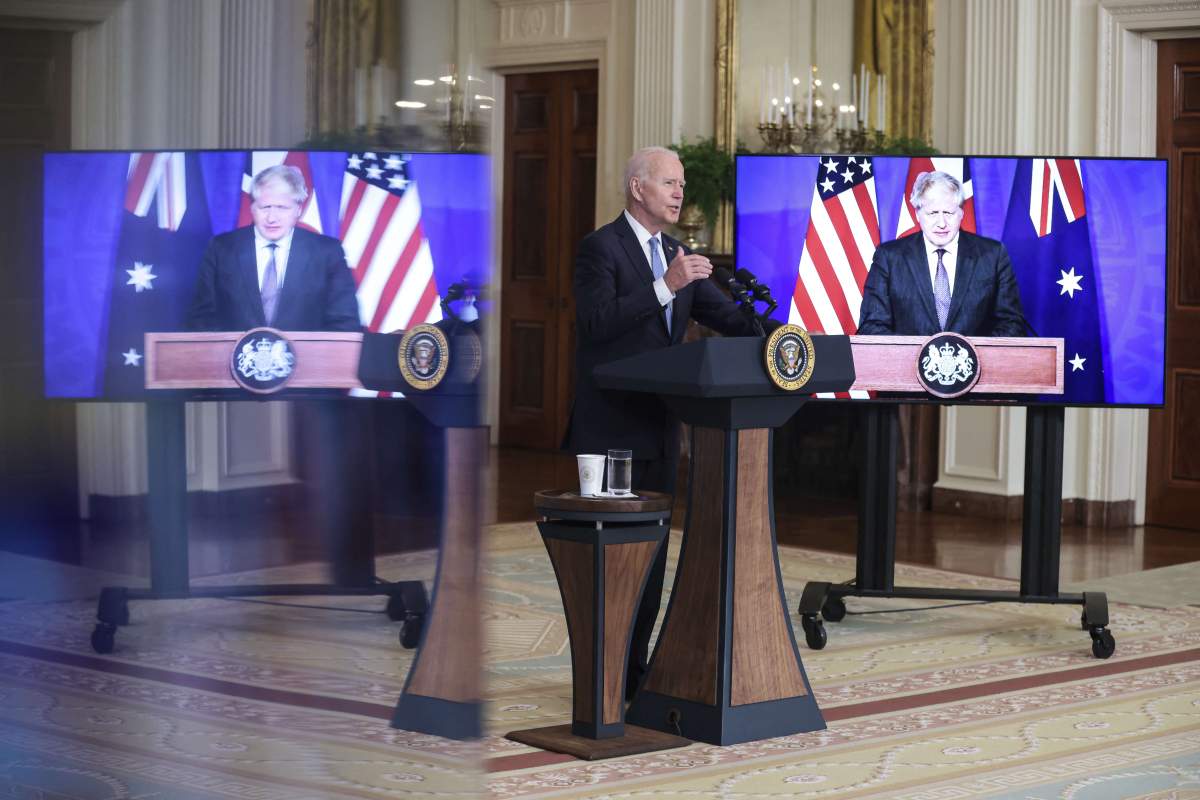U.S. President Joe Biden announced Wednesday that the United States is forming a new Indo-Pacific security alliance with Britain and Australia that will allow for greater sharing of defense capabilities, a move that could deepen a growing chasm in U.S.-China relations.

Biden, British Prime Minister Boris Johnson and Australian Prime Minister Scott Morrison appeared together virtually to detail the new alliance, which will be called AUKUS (pronounced AWK-us).
“We all recognize the imperative of ensuring peace and stability in the Indo-Pacific over the long term,” said Biden, who said the new alliance reflects a broader trend of key European partners playing a role in the Indo-Pacific. “We need to be able to address both the current strategic environment in the region and how it may evolve.”
Canada’s Ministry of National Defence did not confirm or deny whether Canada was asked to be a part of the pact or could be in the future, but spokesperson Daniel Minden said that Defence Minister Harjit Sajjan spoke with his counterparts in Australia and the United Kingdom, while Global Affairs Canada officials spoke with U.S. officials from the U.S. State Department, and all three countries remain Canada’s “close friends and allies.”
“Canada continues to work with its Five Eyes partners on defence technology and research to strengthen our partnership,” Minden said. “We will continue building on existing collaboration with our allies to continue to ensure the safety of Canadians.”
The new security alliance between the U.S., Australia and the U.K. is likely to be seen as a provocative move by China, which has repeatedly lashed out at Biden as he’s sought to refocus U.S. foreign policy on the Pacific in the early going of his presidency.
Before the announcement, a senior administration official sought to play down the idea that the alliance was meant to serve as a deterrent against China in the region. The official, who spoke on the condition of anonymity to preview the announcement, said the alliance’s creation was not aimed at any one country, and is about a larger effort to sustain engagement and deterrence in the Indo-Pacific by the three nations.

“We will have a new opportunity to reinforce Britain’s place at the leading edge of science and technology, strengthening our national expertise, and perhaps most significant, the U.K., Australia and the U.S. will be joined even more closely together, ” Johnson said.
The three countries have agreed to share information in areas including artificial intelligence, cyber and underwater defense capabilities, the official said.

Get daily National news
They announced plans to support Australia acquiring nuclear-powered submarines. To date, the only country that the United States has shared nuclear propulsion technology with is Britain. Biden said Australia is not seeking to develop a nuclear weapons program and information sharing would be limited to helping it develop a submarine fleet.
- Canadian police warn Sikh activist of threat to life as Carney announces India visit
- Punch the monkey’s stuffed orangutan from Ikea sold out in stores
- Dog left abandoned at Las Vegas airport counter adopted by rescuing officer
- Flavor Flav invites U.S. women’s hockey team to ‘real celebration’ after Trump offer
The announcement of the new security alliance comes as the U.S.-China relationship has deteriorated. Beijing has taken exception with Biden administration officials repeatedly calling out China over human rights abuses in Xianjing province, the crackdown on democracy activists in Hong Kong, and cybersecurity breaches originating from China, as well as Beijing’s handling of the coronavirus pandemic and what the White House has labeled as “coercive and unfair” trade practices.
Even as White House officials have repeatedly spoken out about China, administration officials say they want to work with Beijing on areas of common interest, including curbing the pandemic and climate change.
Biden spoke by phone with China’s President Xi Jinping last week amid growing frustration on the American side that high-level engagement between the two leaders’ top advisers has been largely unfruitful.
After the 90-minute phone call, Xinhua News Agency reported that Xi expressed concerns that U.S. government policy toward China has caused “serious difficulties” in relations.
Asked on Tuesday about media reports that Xi had declined to commit to meet with him in person, the U.S. president said it was “untrue.”

The U.S. and Australia, along with India and Japan, are members of a strategic dialogue known as “the Quad.” Biden is set to host fellow Quad leaders at the White House next week.
Biden has sought to rally allies to speak with a more unified voice on China and has tried to send the message that he would take a radically different approach to China than former President Donald Trump, who placed trade and economic issues above all else in the U.S.-China relationship.
In June, at Biden’s urging, Group of Seven nations called on China to respect human rights in Hong Kong and Xinjiang province and to permit a full probe into the origins of COVID-19. While the allies broadly agreed to work toward competing against China, there was less unity on how adversarial a public position the group should take.
The president has also sought to make clear to allies, particularly those in the Quad, that his administration would keep focused on China.
With Japanese Prime Minister Yoshihide Suga, Biden has underscored the U.S. commitment to protecting the Senkaku Islands, a group of uninhabited islets administered by Tokyo but claimed by Beijing. In talks with India’s Prime Minister Narendra Modi, Biden has emphasized the need for “close cooperation to promote a free and open Indo-Pacific.” And with Australia’s Morrison, the president has stressed that the two nations’ alliance was essential to stability in the region.







Comments
Want to discuss? Please read our Commenting Policy first.